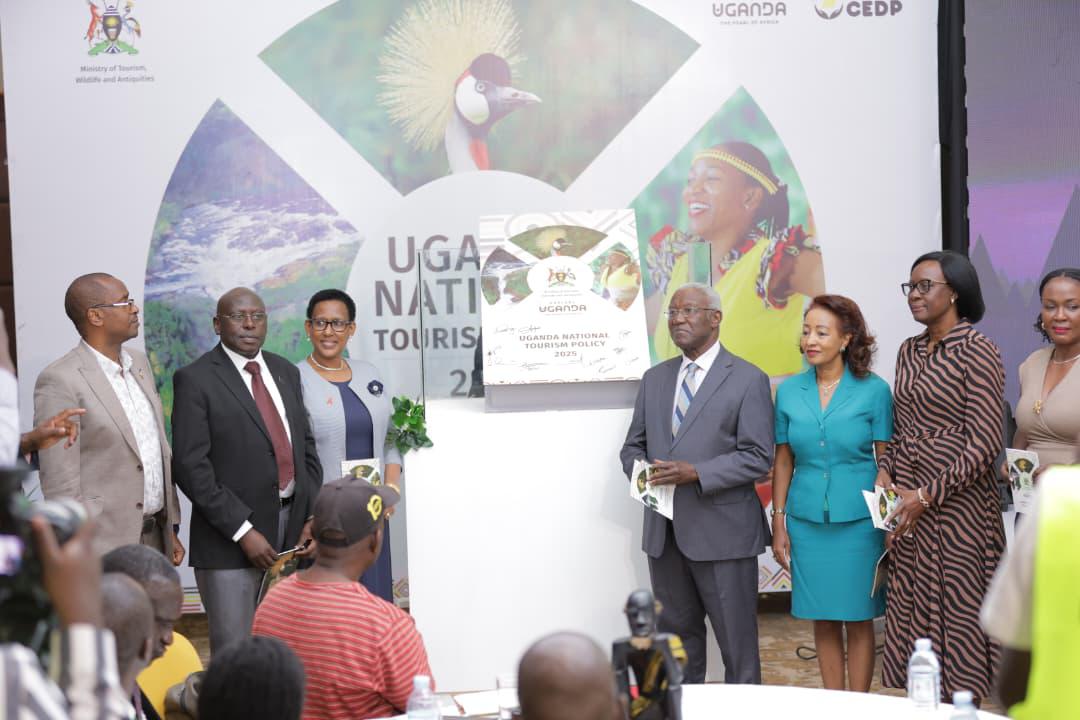Tourism Minister Tom Butime has cautioned that Uganda risks losing its competitiveness in the global tourism industry if it fails to adapt swiftly to disruptions reshaping the sector.
Speaking at the launch of Uganda’s renewed tourism policy, Butime highlighted the profound transformations driven by technology, climate change, emergencies, and evolving traveler expectations.
“The global tourism environment is shifting rapidly due to technology, climate change, emergencies, and evolving traveler preferences,” the minister said.
He added that international and continental competition has intensified, noting, “Destinations that innovate, invest, and adapt will lead the future.”
Butime explained that the new policy is designed to strengthen the sector against shocks that have destabilized global tourism in recent years, including pandemics, economic disruptions, and geopolitical tensions.
The framework aims to build “greater resilience, competitiveness, and sustainability” to protect the industry from emerging risks.
He emphasized that Uganda’s natural advantages—its biodiversity, landscapes, cultural diversity, and hospitality—are no longer sufficient.
“Potential is not progress,” he said, urging increased investment, product development, and enhanced visitor experiences. He stressed that Uganda must assert itself in an industry generating an estimated USD 11 trillion globally and creating millions of jobs.
The new policy aligns with commitments in the NRM Manifesto, the National Development Plan IV, and the Tenfold Growth Strategy.
Butime singled out Meetings, Incentives, Conferences, and Exhibitions (MICE) as a high-value segment Uganda must exploit, describing AFCON 2027 as “a generational opportunity to showcase Uganda to the continent and the world.”
He also said the new Hoima stadium will help spur sports tourism.
Cultural heritage, he noted, is a unique selling point: “There is no Kasun everywhere. Kasun is only here,” highlighting Uganda’s distinct identity.
He added that the country’s youthful population provides an innovative workforce for digital tourism, entertainment, and hospitality.
Peace and stability, Butime said, remain critical to Uganda’s global image. “We are experiencing a peaceful and orderly electoral cycle, which reassures investors and visitors,” he noted.
The minister identified new areas for diversification, including sports, agriculture, education, research, and water-based tourism, citing lakes, rivers, and wetlands as untapped opportunities. He also referenced Namugongo as a key destination for faith-based tourism.
Permanent Secretary in the Ministry of Tourism, Wildlife and Antiquities, Doreen Katusiime, said the policy provides the strategic framework Uganda needs to accelerate economic transformation and secure its place among Africa’s leading destinations.
She described tourism as “a powerful engine intricately linked to our highest national aspirations,” emphasizing that the policy is central to achieving Vision 2040 and the targets of the National Development Plan IV, while operationalizing the government’s Tenfold Growth Strategy.
Katusiime highlighted Uganda’s unmatched natural endowments—from majestic wildlife and green landscapes to the River Nile and rich cultural heritage—which position the country as a premier destination.
She cautioned, however, that these strengths have not been fully utilized.
“Yet to move from that potential to prosperity, we must address persistent challenges of infrastructure, regulatory frameworks, limited investment, and more,” she said.
The policy commits the government to “strategic, coordinated interventions to move Uganda decisively toward being among Africa’s top five tourist destinations.”
She emphasized that tourism’s potential to create jobs, drive foreign exchange earnings, and empower communities has long been acknowledged but underutilized.
The policy represents a clear commitment to confronting these constraints head-on.
Aligned with the East African Community Tourism Protocol and the UN Sustainable Development Goals, the framework is anchored on sustainability, inclusivity, innovation, and competitiveness.
Katusiime called the private sector “the key engine of investment and innovation” and thanked development partners, including the World Bank, for their “unwavering support.”
She also praised local communities as “the ultimate custodians as well as beneficiaries of our natural and cultural heritage.”


